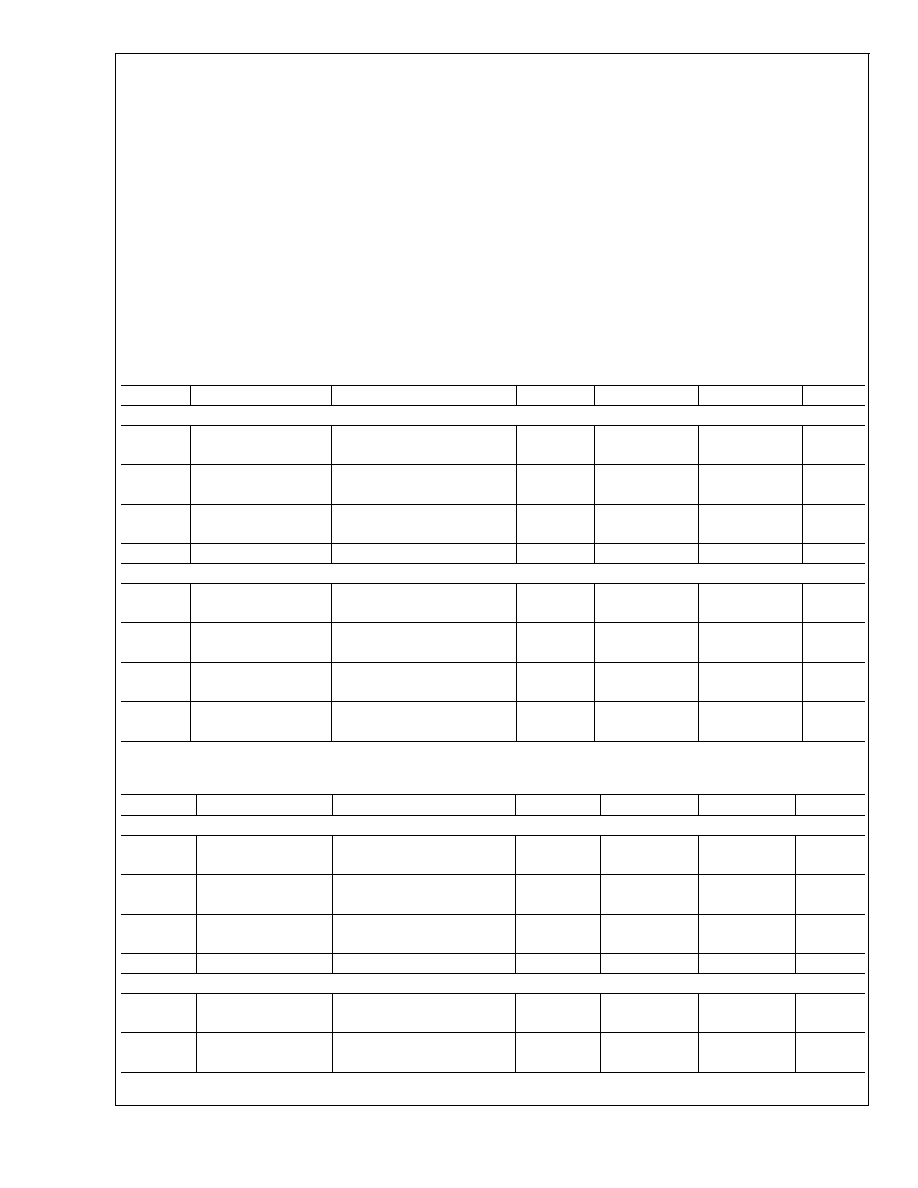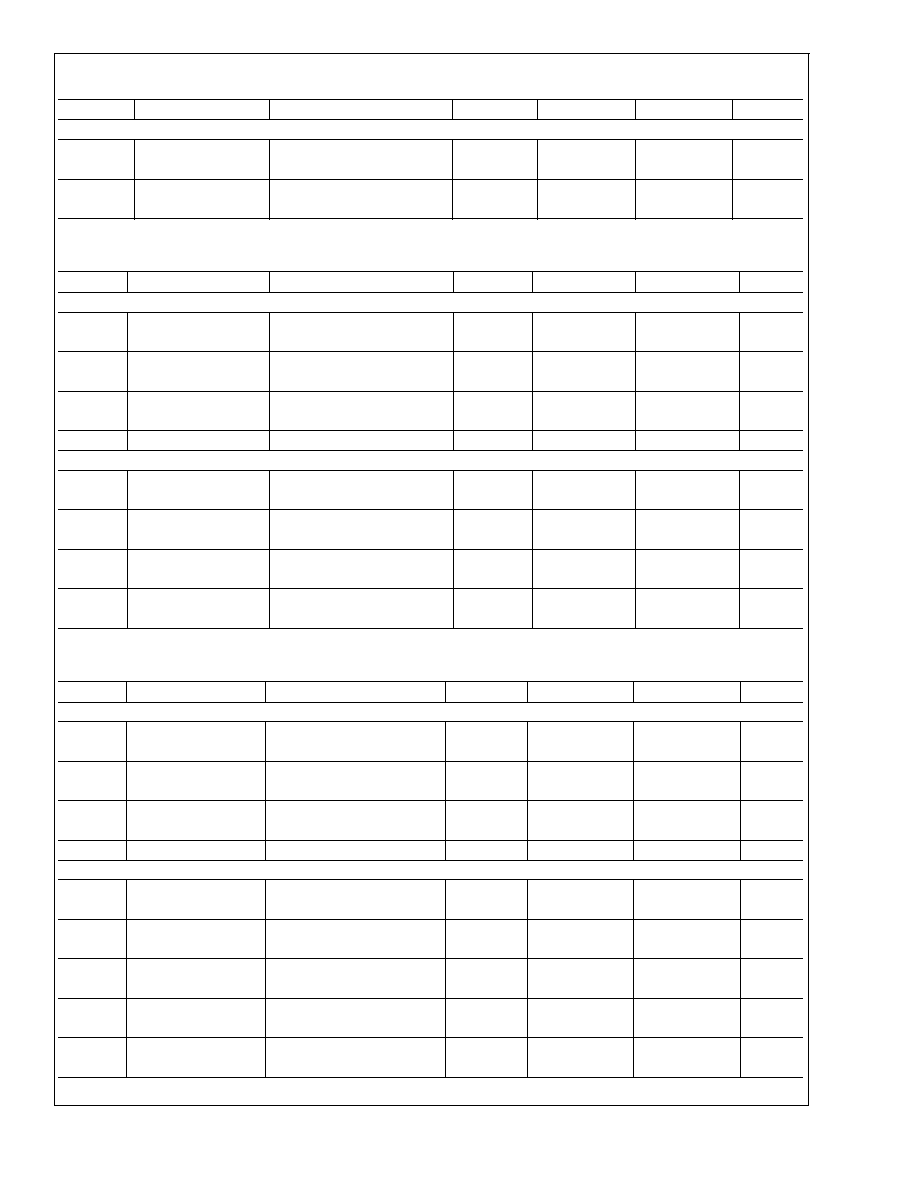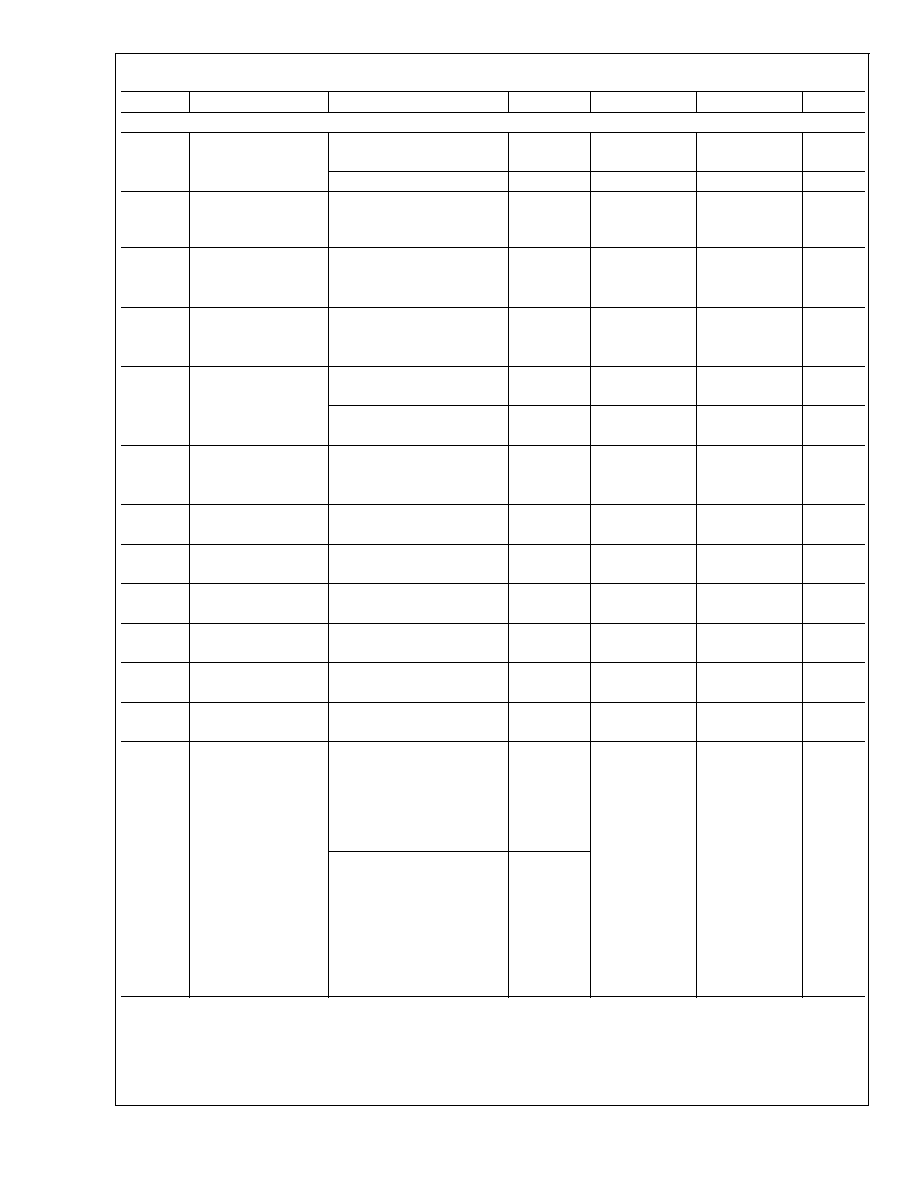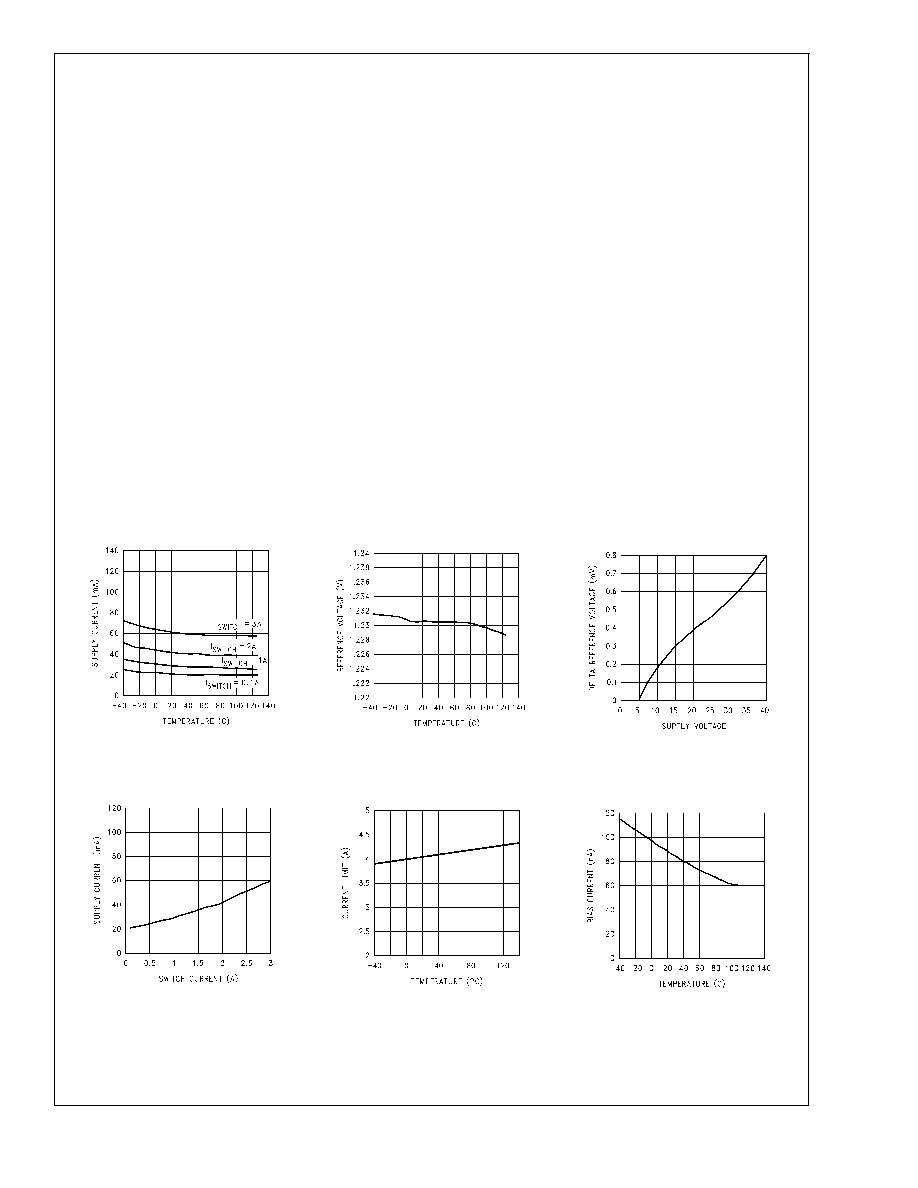
LM2585
SIMPLE SWITCHER
Æ
3A Flyback Regulator
General Description
The LM2585 series of regulators are monolithic integrated
circuits specifically designed for flyback, step-up (boost), and
forward converter applications. The device is available in 4
different output voltage versions: 3.3V, 5.0V, 12V, and ad-
justable.
Requiring a minimum number of external components, these
regulators are cost effective, and simple to use. Included in
the datasheet are typical circuits of boost and flyback regu-
lators. Also listed are selector guides for diodes and capaci-
tors and a family of standard inductors and flyback trans-
formers designed to work with these switching regulators.
The power switch is a 3.0A NPN device that can stand-off
65V. Protecting the power switch are current and thermal
limiting circuits, and an undervoltage lockout circuit. This IC
contains a 100 kHz fixed-frequency internal oscillator that
permits the use of small magnetics. Other features include
soft start mode to reduce in-rush current during start up,
current mode control for improved rejection of input voltage
and output load transients and cycle-by-cycle current limit-
ing. An output voltage tolerance of
±
4%, within specified
input voltages and output load conditions, is guaranteed for
the power supply system.
Features
n
Requires few external components
n
Family of standard inductors and transformers
n
NPN output switches 3.0A, can stand off 65V
n
Wide input voltage range: 4V to 40V
n
Current-mode operation for improved transient
response, line regulation, and current limit
n
100 kHz switching frequency
n
Internal soft-start function reduces in-rush current during
start-up
n
Output transistor protected by current limit, under
voltage lockout, and thermal shutdown
n
System Output Voltage Tolerance of
±
4% max over line
and load conditions
Typical Applications
n
Flyback regulator
n
Multiple-output regulator
n
Simple boost regulator
n
Forward converter
Flyback Regulator
Ordering Information
Package Type
NSC Package
Order Number
Drawing
5-Lead TO-220 Bent, Staggered Leads
T05D
LM2585T-3.3, LM2585T-5.0, LM2585T-12, LM2585T-ADJ
5-Lead TO-263
TS5B
LM2585S-3.3, LM2585S-5.0, LM2585S-12, LM2585S-ADJ
5-Lead TO-263 Tape and Reel
TS5B
LM2585SX-3.3, LM2585SX-5.0, LM2585SX-12,
LM2585SX-ADJ
SIMPLE SWITCHER and
Switchers Made Simple
TM
are registered trademarks of National Semiconductor Corporation.
DS012515-1
April 2000
LM2585
SIMPLE
SWITCHER
3A
Flyback
Regulator
© 2001 National Semiconductor Corporation
DS012515
www.national.com

Absolute Maximum Ratings
(Note 1)
If Military/Aerospace specified devices are required,
please contact the National Semiconductor Sales Office/
Distributors for availability and specifications.
Input Voltage
-0.4V
V
IN
45V
Switch Voltage
-0.4V
V
SW
65V
Switch Current (Note 2)
Internally Limited
Compensation Pin Voltage
-0.4V
V
COMP
2.4V
Feedback Pin Voltage
-0.4V
V
FB
2 V
OUT
Storage Temperature Range
-65∞C to +150∞C
Lead Temperature
(Soldering, 10 sec.)
260∞C
Maximum Junction Temperature
(Note 3)
150∞C
Power Dissipation (Note 3)
Internally Limited
Minimum ESD Rating
(C = 100 pF, R = 1.5 k
)
2 kV
Operating Ratings
Supply Voltage
4V
V
IN
40V
Output Switch Voltage
0V
V
SW
60V
Output Switch Current
I
SW
3.0A
Junction Temperature Range
-40∞C
T
J
+125∞C
Electrical Characteristics
LM2585-3.3
Specifications with standard type face are for T
J
= 25∞C, and those in bold type face apply over full Operating Temperature
Range. Unless otherwise specified, V
IN
= 5V.
Symbol
Parameters
Conditions
Typical
Min
Max
Units
SYSTEM PARAMETERS Test Circuit of
Figure 2 (Note 4)
V
OUT
Output Voltage
V
IN
= 4V to 12V
3.3
3.17/3.14
3.43/3.46
V
I
LOAD
= 0.3A to 1.2A
V
OUT
/
Line Regulation
V
IN
= 4V to 12V
20
50/100
mV
V
IN
I
LOAD
= 0.3A
V
OUT
/
Load Regulation
V
IN
= 12V
20
50/100
mV
I
LOAD
I
LOAD
= 0.3A to 1.2A
Efficiency
V
IN
= 5V, I
LOAD
= 0.3A
76
%
UNIQUE DEVICE PARAMETERS (Note 5)
V
REF
Output Reference
Measured at Feedback Pin
3.3
3.242/3.234
3.358/3.366
V
Voltage
V
COMP
= 1.0V
V
REF
Reference Voltage
V
IN
= 4V to 40V
2.0
mV
Line Regulation
G
M
Error Amp
I
COMP
= -30 µA to +30 µA
1.193
0.678
2.259
mmho
Transconductance
V
COMP
= 1.0V
A
VOL
Error Amp
V
COMP
= 0.5V to 1.6V
260
151/75
V/V
Voltage Gain
R
COMP
= 1.0 M
(Note 6)
LM2585-5.0
Symbol
Parameters
Conditions
Typical
Min
Max
Units
SYSTEM PARAMETERS Test Circuit of
Figure 2 (Note 4)
V
OUT
Output Voltage
V
IN
= 4V to 12V
5.0
4.80/4.75
5.20/5.25
V
I
LOAD
= 0.3A to 1.1A
V
OUT
/
Line Regulation
V
IN
= 4V to 12V
20
50/100
mV
V
IN
I
LOAD
= 0.3A
V
OUT
/
Load Regulation
V
IN
= 12V
20
50/100
mV
I
LOAD
I
LOAD
= 0.3A to 1.1A
Efficiency
V
IN
= 12V, I
LOAD
= 0.6A
80
%
UNIQUE DEVICE PARAMETERS (Note 5)
V
REF
Output Reference
Measured at Feedback Pin
5.0
4.913/4.900
5.088/5.100
V
Voltage
V
COMP
= 1.0V
V
REF
Reference Voltage
V
IN
= 4V to 40V
3.3
mV
Line Regulation
LM2585
www.national.com
2

LM2585-5.0
(Continued)
Symbol
Parameters
Conditions
Typical
Min
Max
Units
UNIQUE DEVICE PARAMETERS (Note 5)
G
M
Error Amp
I
COMP
= -30 µA to +30 µA
0.750
0.447
1.491
mmho
Transconductance
V
COMP
= 1.0V
A
VOL
Error Amp
V
COMP
= 0.5V to 1.6V
165
99/49
V/V
Voltage Gain
R
COMP
= 1.0 M
(Note 6)
LM2585-12
Symbol
Parameters
Conditions
Typical
Min
Max
Units
SYSTEM PARAMETERS Test Circuit of
Figure 3 (Note 4)
V
OUT
Output Voltage
V
IN
= 4V to 10V
12.0
11.52/11.40
12.48/12.60
V
I
LOAD
= 0.2A to 0.8A
V
OUT
/
Line Regulation
V
IN
= 4V to 10V
20
100/200
mV
V
IN
I
LOAD
= 0.2A
V
OUT
/
Load Regulation
V
IN
= 10V
20
100/200
mV
I
LOAD
I
LOAD
= 0.2A to 0.8A
Efficiency
V
IN
= 10V, I
LOAD
= 0.6A
93
%
UNIQUE DEVICE PARAMETERS (Note 5)
V
REF
Output Reference
Measured at Feedback Pin
12.0
11.79/11.76
12.21/12.24
V
Voltage
V
COMP
= 1.0V
V
REF
Reference Voltage
V
IN
= 4V to 40V
7.8
mV
Line Regulation
G
M
Error Amp
I
COMP
= -30 µA to +30 µA
0.328
0.186
0.621
mmho
Transconductance
V
COMP
= 1.0V
A
VOL
Error Amp
V
COMP
= 0.5V to 1.6V
70
41/21
V/V
Voltage Gain
R
COMP
= 1.0 M
(Note 6)
LM2585-ADJ
Symbol
Parameters
Conditions
Typical
Min
Max
Units
SYSTEM PARAMETERS Test Circuit of
Figure 3 (Note 4)
V
OUT
Output Voltage
V
IN
= 4V to 10V
12.0
11.52/11.40
12.48/12.60
V
I
LOAD
= 0.2A to 0.8A
V
OUT
/
Line Regulation
V
IN
= 4V to 10V
20
100/200
mV
V
IN
I
LOAD
= 0.2A
V
OUT
/
Load Regulation
V
IN
= 10V
20
100/200
mV
I
LOAD
I
LOAD
= 0.2A to 0.8A
Efficiency
V
IN
= 10V, I
LOAD
= 0.6A
93
%
UNIQUE DEVICE PARAMETERS (Note 5)
V
REF
Output Reference
Measured at Feedback Pin
1.230
1.208/1.205
1.252/1.255
V
Voltage
V
COMP
= 1.0V
V
REF
Reference Voltage
V
IN
= 4V to 40V
1.5
mV
Line Regulation
G
M
Error Amp
I
COMP
= -30 µA to +30 µA
3.200
1.800
6.000
mmho
Transconductance
V
COMP
= 1.0V
A
VOL
Error Amp
V
COMP
= 0.5V to 1.6V
670
400/200
V/V
Voltage Gain
R
COMP
= 1.0 M
(Note 6)
I
B
Error Amp
V
COMP
= 1.0V
125
425/600
nA
Input Bias Current
LM2585
www.national.com
3

Electrical Characteristics (All Versions)
Symbol
Parameters
Conditions
Typical
Min
Max
Units
COMMON DEVICE PARAMETERS for all versions (Note 5)
I
S
Input Supply
(Switch Off)
11
15.5/16.5
mA
Current
(Note 8)
I
SWITCH
= 1.8A
50
100/115
mA
V
UV
Input Supply
R
LOAD
= 100
3.30
3.05
3.75
V
Undervoltage
Lockout
f
O
Oscillator Frequency
Measured at Switch Pin
R
LOAD
= 100
100
85/75
115/125
kHz
V
COMP
= 1.0V
f
SC
Short-Circuit
Measured at Switch Pin
Frequency
R
LOAD
= 100
25
kHz
V
FEEDBACK
= 1.15V
V
EAO
Error Amplifier
Upper Limit
2.8
2.6/2.4
V
Output Swing
(Note 7)
Lower Limit
0.25
0.40/0.55
V
(Note 8)
I
EAO
Error Amp
(Note 9)
Output Current
165
110/70
260/320
µA
(Source or Sink)
I
SS
Soft Start Current
V
FEEDBACK
= 0.92V
11.0
8.0/7.0
17.0/19.0
µA
V
COMP
= 1.0V
D
Maximum Duty
R
LOAD
= 100
98
93/90
%
Cycle
(Note 7)
I
L
Switch Leakage
Switch Off
15
300/600
µA
Current
V
SWITCH
= 60V
V
SUS
Switch Sustaining
dV/dT = 1.5V/ns
65
V
Voltage
V
SAT
Switch Saturation
I
SWITCH
= 3.0A
0.45
0.65/0.9
V
Voltage
I
CL
NPN Switch
4.0
3.0
7.0
A
Current Limit
JA
Thermal Resistance
T Package, Junction to
Ambient (Note 10)
65
JA
T Package, Junction to
Ambient (Note 11)
45
JC
T Package, Junction to
Case
2
JA
S Package, Junction to
Ambient (Note 12)
56
∞C/W
JA
S Package, Junction to
Ambient (Note 13)
35
JA
S Package, Junction to
Ambient (Note 14)
26
JC
S Package, Junction to
Case
2
Note 1: Absolute Maximum Ratings indicate limits beyond which damage to the device may occur. Operating ratings indicate conditions the device is intended to
be functional, but device parameter specifications may not be guaranteed under these conditions. For guaranteed specifications and test conditions, see the
Electrical Characteristics.
Note 2: Note that switch current and output current are not identical in a step-up regulator. Output current cannot be internally limited when the LM2585 is used as
a step-up regulator. To prevent damage to the switch, the output current must be externally limited to 3A. However, output current is internally limited when the
LM2585 is used as a flyback regulator (see the Application Hints section for more information).
LM2585
www.national.com
4

Electrical Characteristics (All Versions)
(Continued)
Note 3: The junction temperature of the device (T
J
) is a function of the ambient temperature (T
A
), the junction-to-ambient thermal resistance (
JA
), and the power
dissipation of the device (P
D
). A thermal shutdown will occur if the temperature exceeds the maximum junction temperature of the device: P
D
x
JA
+ T
A(MAX)
T
J(MAX)
. For a safe thermal design, check that the maximum power dissipated by the device is less than: P
D
[T
J(MAX)
- T
A(MAX)
)]/
JA
. When calculating the
maximum allowable power dissipation, derate the maximum junction temperature -- this ensures a margin of safety in the thermal design.
Note 4: External components such as the diode, inductor, input and output capacitors can affect switching regulator performance. When the LM2585 is used as
shown in Figures
Figure 2
and
Figure 3
, system performance will be as specified by the system parameters.
Note 5: All room temperature limits are 100% production tested, and all limits at temperature extremes are guaranteed via correlation using standard Statistical
Quality Control (SQC) methods.
Note 6: A 1.0 M
resistor is connected to the compensation pin (which is the error amplifier output) to ensure accuracy in measuring A
VOL
.
Note 7: To measure this parameter, the feedback voltage is set to a low value, depending on the output version of the device, to force the error amplifier output high.
Adj: V
FB
= 1.05V; 3.3V: V
FB
= 2.81V; 5.0V: V
FB
= 4.25V; 12V: V
FB
= 10.20V.
Note 8: To measure this parameter, the feedback voltage is set to a high value, depending on the output version of the device, to force the error amplifier output
low. Adj: V
FB
= 1.41V; 3.3V: V
FB
= 3.80V; 5.0V: V
FB
= 5.75V; 12V: V
FB
= 13.80V.
Note 9: To measure the worst-case error amplifier output current, the LM2585 is tested with the feedback voltage set to its low value (specified in (Note 7) and at
its high value (specified in (Note 8) .
Note 10: Junction to ambient thermal resistance (no external heat sink) for the 5 lead TO-220 package mounted vertically, with
1
/
2
inch leads in a socket, or on a
PC board with minimum copper area.
Note 11: Junction to ambient thermal resistance (no external heat sink) for the 5 lead TO-220 package mounted vertically, with
1
/
2
inch leads soldered to a PC board
containing approximately 4 square inches of (1oz.) copper area surrounding the leads.
Note 12: Junction to ambient thermal resistance for the 5 lead TO-263 mounted horizontally against a PC board area of 0.136 square inches (the same size as the
TO-263 package) of 1 oz. (0.0014 in. thick) copper.
Note 13: Junction to ambient thermal resistance for the 5 lead TO-263 mounted horizontally against a PC board area of 0.4896 square inches (3.6 times the area
of the TO-263 package) of 1 oz. (0.0014 in. thick) copper.
Note 14: Junction to ambient thermal resistance for the 5 lead TO-263 mounted horizontally against a PC board copper area of 1.0064 square inches (7.4 times
the area of the TO-263 package) of 1 oz. (0.0014 in. thick) copper. Additional copper area will reduce thermal resistance further. See the thermal model in
Switchers
Made Simple
software.
Typical Performance Characteristics
Supply Current
vs Temperature
DS012515-2
Reference Voltage
vs Temperature
DS012515-3
Reference Voltage
vs Supply Voltage
DS012515-4
Supply Current
vs Switch Current
DS012515-5
Current Limit
vs Temperature
DS012515-6
Feedback Pin Bias
Current vs Temperature
DS012515-7
LM2585
www.national.com
5




